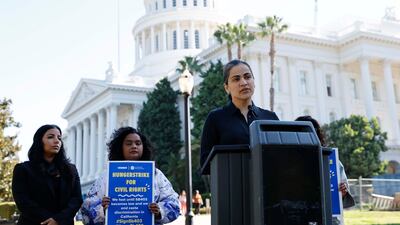California's state legislature has voted to ban caste discrimination in the state, with politicians saying the law would protect people of South Asian descent.
The bill will now head to Governor Gavin Newsom's desk. Should he sign it, California will be the first state in the US to ban caste discrimination.
State and federal laws already ban discrimination based on gender, race and religion. The recently passed California law would ban discrimination based on immigration status, ancestry, medical conditions and sexual orientation.
Seattle banned caste discrimination in February, becoming the first US city to do so.
What is caste discrimination?
Caste systems divide people into hierarchical groups, with a person placed into a particular group upon their birth.
Ideas connected to pollution and purity are prevalent in language used to describe high- and low-caste communities, according to a report from Human Rights Watch, and they are used to segregate low-caste communities from the rest of society and block their progress in some occupations.
The caste system in India, probably the most well known, dates back 3,000 years and was banned a year after the country gained its independence in 1947. But discrimination still continues.
Dalits, members of the lowest caste, continue to face abuse in India and struggle to achieve upwards mobility.
Caste discrimination is most associated with India and Hinduism, but such divisions can be seen around the world. Human Rights Watch reported that at least 250 million people face caste discrimination in Asia, Africa, the Middle East and elsewhere.
Why did California politicians vote to ban caste discrimination?
Indians, mostly Hindus, are one of the biggest immigrant groups in the US and over the years the country has become the new theatre for the ancient discriminatory practice, particularly in the employment sector.
In 2020, a California state agency sued tech company Cisco over allegations that a Hindu manager had discriminated against a lower-caste employee. The case was the first of many later complaints, with Dalits complaining that they faced discrimination at work, including caste-based slurs, sexual harassment and firings.
The bill was sponsored by Aisha Wahab, the first Muslim and Afghan American elected to the state's legislature.
Ms Wahab said the bill would protect people of South Asian descent from being discriminated against in housing and education as well as jobs in the technology sector.
Opponents argue that the bill would harm Hindus and Indian Americans who are associated with the caste system.
The Hindu American Foundation called on Mr Newsom to veto the bill.
California voters can veto laws passed by the legislature if enough people sign a petition. Should it receive enough signatures, a referendum vote will be held asking voters whether to keep the law or veto it.

